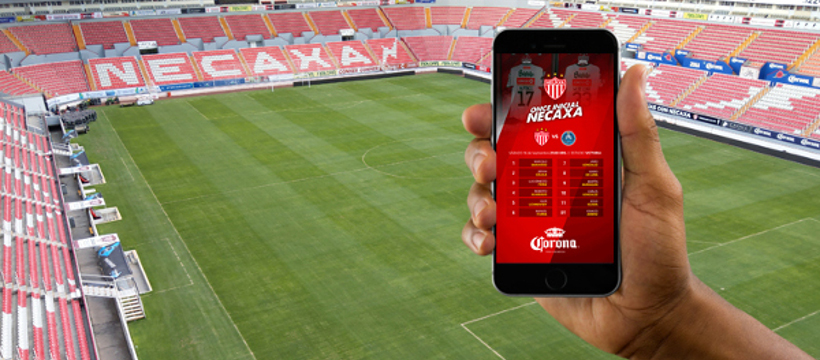
Mexican soccer fans access and share contents via beacon solution
The Estadio Victoria stadium, in Aguascalientes, Mexico, and the Club Necaxa soccer team that plays there, are sharing content about games, players and sponsors with Bluetooth Low Energy (BLE)-based technology and an app from Be Free Solutions. The Mexican BLE digital marketing platform startup is now in discussions with other Mexican teams, as well as companies in Texas, to make the app available for them as well.
The beacon-based system enables Club Necaxa to share information with fans while they are at the stadium, based on their location, and to store and share that data with others who may not be onsite, using the Be Free MX app. The stadium and club can then use that information to engage with fans in the future.
Be Free Solutions, founded this year, is a beacon technology spinoff of RFID company Tecnologias GC, exclusive Blueup distributor for Mexico. The company was founded to meet a technology need in Mexico for beacon-based solutions that were lower in cost than RIFD installations and relatively easy to launch, with the use of an app rather than an integrated software platform that might be required for an RFID system. The Estadio Victoria deployment is its first application.
Estadio Victoria has a capacity of 25,851 seats and is mainly used for soccer games. To engage with ticket holders, the stadium and team traditionally printed fliers that listed information about the team, along with any coupons or promotional offers from businesses selling merchandise, food or drinks at the venue, as well as from sponsors. However, the fliers gained little traction from fans and created additional garbage that then had to be cleaned up after games, explains Luis Angel Gonzalez Villa, Tecnologicas GC's CEO and Be Free Solutions' CTO.
Be Free Solutions is providing a system that eliminates manual paper-based methods and furthers engagement, the company reports. It installed 40 BlueUp beacons around the stadium's exterior and interior and offered the firm's Be Free app.
There are two ways for fans to use the system: either with or without the app. Upon arriving at the stadium, each visitor is instructed by signage to turn on the Bluetooth functionality in his or her smartphone. Even without an app, the phone then receives beacon transmissions and can access data relevant to that person's location. In the parking lot, the fan can receive alerts regarding the time of games and the team lineup. Then, once the match has begun, he or she can receive notifications about a drop in ticket pricing, for instance.
Inside the stadium, the app can provide information about the team, the players and, in the event of a goal, who scored it. If a phone is located in the low-cost seating area, a beacon could prompt that phone to open content about the availability of seat upgrades for that game or for future games. Information and coupons with regard to sponsoring businesses can be provided as well.
The second option for fans offers greater functionality. In this case, a visitor could choose to download the Be Free app on an Android or iOS device. The app would allow him or her to save information about coupons, loyalty points or the team playing at the stadium, and that data can then be shared. For instance, if a guest receives a coupon for a business located on or off the premises, he or she can forward that content to a contact via WhatsApp or Facebook Messaging.
If the recipient of that content opens the relevant link, the stadium, club or sponsor can view information indicating which phone accessed that data, along with its GPS location. The team or other related businesses can then employ that data to send focused advertising. For instance, if the team scores a goal, a fan can forward that information to a friend, along with a replay video. Upon opening that information, the friend could then be targeted as a team fan, and might receive coupons for a jersey.
By using beacon technology, Gonzalez Villa says, the app is able to identify who is in the stadium at any given time, and where, so that content can be better targeted to that user. The app can not only send promotions based on that individual's location—such as near the snack bar—but also use the time with that location to generate such offers as a discount during the last 15 minutes of a game.
The team, the stadium and Be Free Solutions are still evaluating fan response. However, they have initially found that approximately 12 percent of those who come to the stadium download and use the app.
The full-size article in RFID Journal can be found here.
